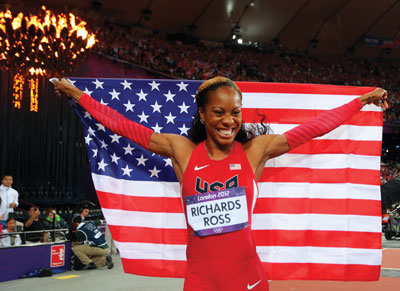The U.S. Olympic Committee’s new procedure to permit non-Olympic sponsors to run campaigns featuring Olympians during the 2016 Games could cause new problems while solving others, say agents briefed on the plans.
Since the USOC unveiled an advance-approval system designed to relax rules against ambush marketing that many athletes considered unfair, marketers and agents have praised the concept but piled on questions over details. They worry about the USOC’s fairness and consistency in granting the waivers, as well as the simple question of whether it’s too much work for the nonprofit, which has pledged to provide timely, specific feedback on every request.
 |
Sanya Richards-Ross led an effort to win Rule 40 changes.
Photo by: GETTY IMAGES
|
“That’s an unknown because we’re getting into new territory for a lot of this,” said Patrick Quinn of Chicago Sports & Entertainment Partners, who speculated that a requirement to obtain approval of every social media post could prove unwieldy, even if the total number of campaigns isn’t. Lisa Baird, USOC chief marketing officer, said her team is prepared for the workload but admitted they don’t really know what to expect.
The USOC’s new guidelines, published June 9, set a Jan. 27, 2016, deadline for athletes and their sponsors to submit campaign concepts for approval for the Rio Games. A campaign must start before March 27 and run continuously through the Olympics, which run Aug. 5-21, 2016, and also must avoid Olympic imagery or intellectual property.
Those early deadlines are meant to protect official USOC and worldwide Olympic sponsors’ rights to advertise around Olympic trials, Baird said. It’s the same deadlines faced by official sponsors, who also must submit their creative work for approval by January.
Agents have questioned how the USOC can fairly judge a nonsponsor’s waiver request when its primary interest rests with protecting lucrative relationships with official sponsors. Baird said she’s confident the USOC will protect confidentiality by creating two review teams. Mitch Poll, managing director of partnership marketing, will review sponsor submissions, while Chris Coleman, director of athlete marketing, will oversee nonsponsors’ waiver requests.
“We have two different departments doing it, so we’re preserving confidentiality between different departments,” Baird said. “This is actually not the first time a competitor sponsor has shown us something.”
Quinn said the guidelines include words that are bound to cause friction, like “continuous,” and also seem to prohibit marketers from using words that aren’t actually trademarked by the Olympic movement, such as “Rio” and “gold.”
The USOC has promised to give specific reasons for denying a request.
One exception to the deadlines will be for athletes who want to maintain NCAA eligibility to compete in later championships, Baird said.
Until now, the IOC’s Rule 40 had banned athletes from selling anything not offered by an official sponsor during the weeks immediately before and during the Olympics, just when their value peaks. Every agent contacted for this story believes the new rules offer more flexibility and chances to make money but won’t end the marketing tensions between athletes and the USOC.
Quinn said he thinks the USOC wants to facilitate nonofficial deals because those contracts relieve pressure on the committee to fund athletes. But there’s nevertheless plenty of gray area to explore.
“So the question is, which direction are you trying to bend the rules?” Quinn said. “And it stands to reason an agent is going to want to try to bend the rules in favor of the client, and the USOC is going to want to bend the rules in favor of being conservative. That’s not news.”




